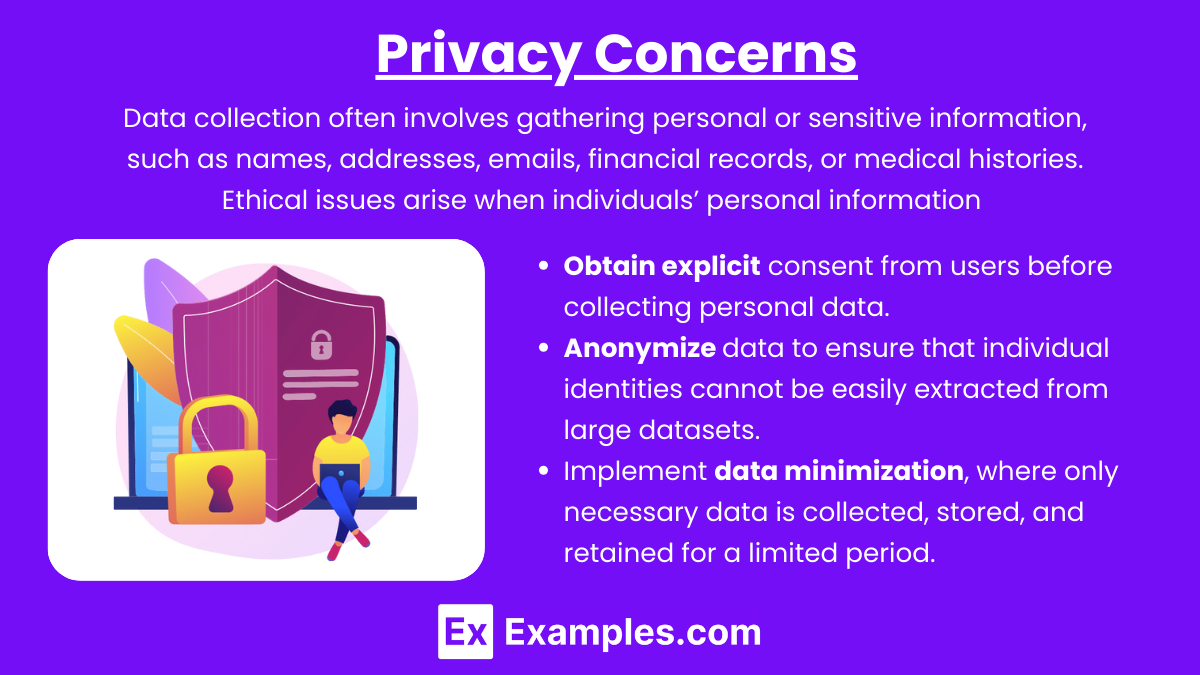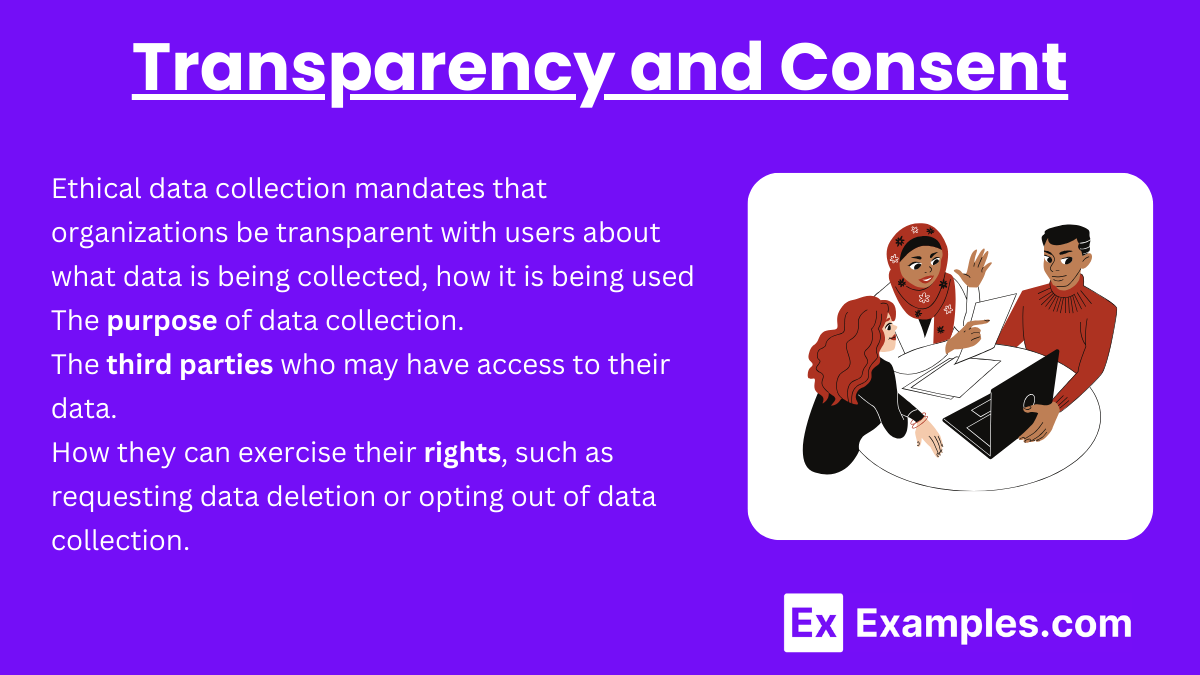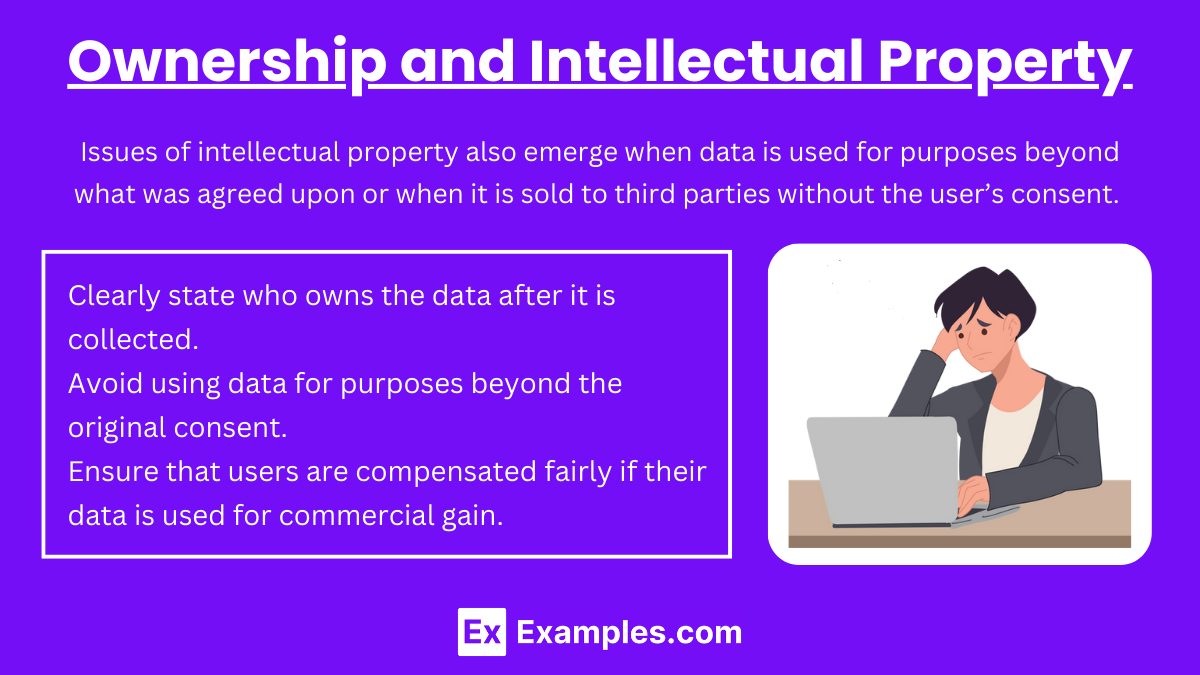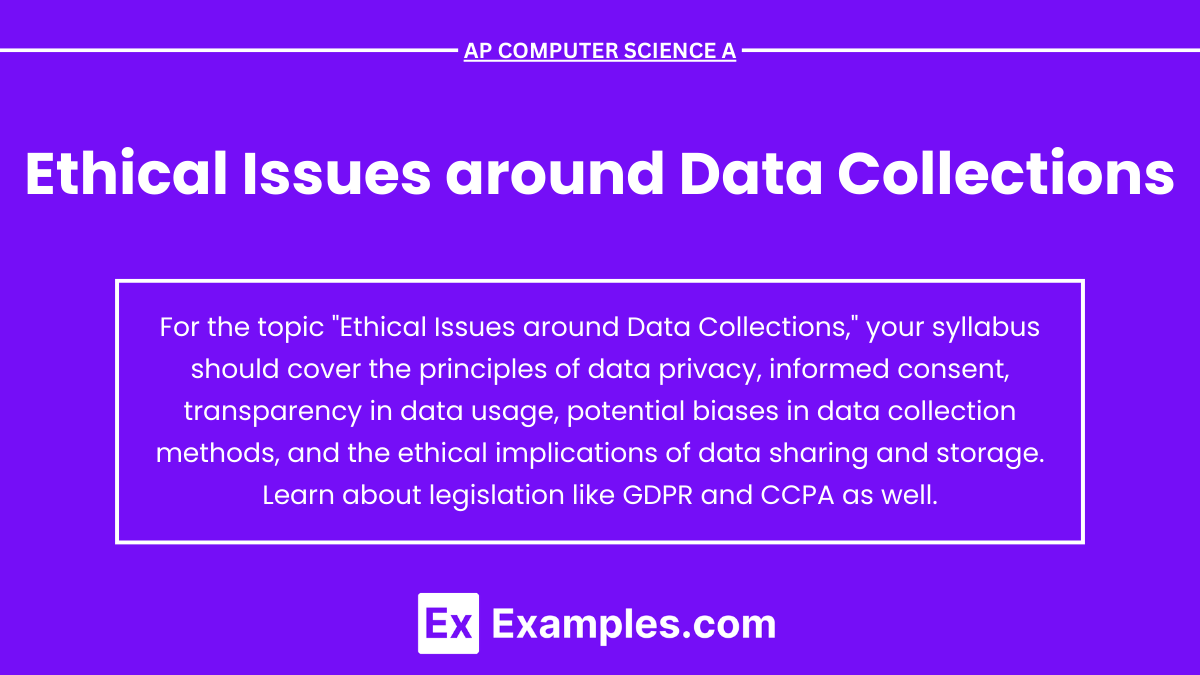In AP Computer Science, understanding ethical issues around data collection is essential as technology increasingly relies on vast amounts of data. Key ethical concerns include privacy, security, transparency, bias, and fairness. Developers must ensure responsible practices, such as obtaining user consent, protecting data from breaches, and minimizing bias in algorithms. Legal compliance and addressing environmental impacts are also crucial. By exploring these issues, students learn how to ethically handle data while developing software solutions, promoting trust, and safeguarding individual rights in the digital age.
Free AP Computer Science A Practice Test
Learning Objectives
For the topic "Ethical Issues around Data Collections" in AP Computer Science A, you should learn to identify privacy concerns, understand data security measures, and recognize the importance of transparency and consent in data handling. You should also grasp the concepts of bias and fairness in algorithms, intellectual property rights related to data, and the legal regulations governing data collection. Additionally, you must explore the societal impacts of surveillance and environmental considerations in data storage and processing, ensuring responsible and ethical data management.
Ethical Issues around Data Collection in Computer Science
In the context of AP Computer Science A, understanding the ethical issues surrounding data collection is vital, as it helps programmers and developers navigate complex moral considerations when handling data. The use of large datasets and personal information has raised numerous ethical concerns, primarily revolving around privacy, security, and fairness.
Privacy Concerns

Data collection often involves gathering personal or sensitive information, such as names, addresses, emails, financial records, or medical histories. Ethical issues arise when individuals’ personal information is collected without their informed consent or is used in ways that were not disclosed. To address privacy concerns, organizations must:
Obtain explicit consent from users before collecting personal data.
Anonymize data to ensure that individual identities cannot be easily extracted from large datasets.
Implement data minimization, where only necessary data is collected, stored, and retained for a limited period.
Data Security
The responsibility of safeguarding collected data from unauthorized access or breaches is a major ethical consideration. Data security issues may arise if the data is inadequately protected, leading to breaches that expose sensitive information. Ethically, organizations are expected to:
Use strong encryption to protect stored and transmitted data.
Regularly update systems to address vulnerabilities and prevent potential attacks.
Ensure that data is stored in secure environments and restrict access to authorized personnel only.
Transparency and Consent

Ethical data collection mandates that organizations be transparent with users about what data is being collected, how it is being used, and who it is being shared with. Users should have a clear understanding of:
The purpose of data collection.
The third parties who may have access to their data.
How they can exercise their rights, such as requesting data deletion or opting out of data collection.
Transparency also involves providing clear terms of service and privacy policies written in plain language so that users can understand them without a legal background.
Bias and Fairness in Data Collection
Ethical data collection practices must ensure that the data gathered does not perpetuate biases, leading to unfair treatment of certain groups. Data collected and used in AI or machine learning systems may be biased if it reflects discriminatory practices or stereotypes, leading to biased algorithms. To prevent bias, developers should:
Use diverse datasets that accurately represent the population.
Regularly audit algorithms to detect and mitigate bias.
Avoid using historically biased data, which can reinforce discriminatory patterns in decision-making.
Ownership and Intellectual Property

Ethical questions around data ownership arise when individuals or entities claim the right to control or benefit from data collected. Issues of intellectual property also emerge when data is used for purposes beyond what was agreed upon or when it is sold to third parties without the user’s consent. Ethically, organizations should:
Clearly state who owns the data after it is collected.
Avoid using data for purposes beyond the original consent.
Ensure that users are compensated fairly if their data is used for commercial gain.
Examples
Example 1: Informed Consent and Data Misuse
A common ethical issue arises when companies collect data without obtaining informed consent from users. For instance, if an app collects location data without notifying users or explaining how the data will be used, it violates their privacy rights. Even if consent is obtained, using the data for purposes not originally disclosed, such as selling it to third parties, further breaches ethical standards.
Example 2: Data Breaches and Security Failures
Data breaches pose significant ethical challenges, particularly when sensitive information such as credit card numbers or social security data is exposed. In 2017, the Equifax data breach compromised the personal information of over 140 million people, including addresses, credit history, and other critical data. This incident highlighted the ethical obligation of companies to ensure that they are implementing robust security measures to protect user data from malicious attacks.
Example 3: Bias in Data and Algorithmic Discrimination
When datasets used for training algorithms are biased, it leads to unethical outcomes. For example, facial recognition technology has been found to misidentify individuals of certain racial backgrounds at higher rates. This occurs when the training data lacks diversity and over-represents particular groups, leading to flawed systems that discriminate against minorities. This raises serious ethical concerns about fairness and equality in the use of data-driven technologies.
Example 4: Data Ownership and Exploitation
Ethical issues arise when users are not fully aware of who owns their data once it is collected. Social media platforms, for instance, often claim ownership of user-generated content and sell this data to advertisers. Users may be unaware that their personal information is being monetized, raising concerns about exploitation and the need for greater transparency in how data is used for commercial purposes.
Example 5: Government Surveillance and Privacy Intrusion
Governments collecting vast amounts of data on citizens without transparency or adequate oversight can lead to ethical issues around surveillance and control. The mass collection of phone records or social media activity, often justified as a national security measure, infringes on individuals' rights to privacy. Ethical questions are raised when such practices go beyond necessary surveillance and create an atmosphere of unwarranted monitoring, violating civil liberties.
Multiple Choice Questions
Question 1
Which of the following is an ethical concern when collecting personal data without user consent?
A. Increased storage capacity
B. Inability to process large datasets
C. Violation of privacy rights
D. Higher data transfer speeds
Answer: C. Violation of privacy rights
Explanation: Collecting personal data without the informed consent of the user is a violation of privacy rights. Ethical data collection requires explicit user consent to ensure that individuals are aware of and agree to how their personal information is being used. This is important to maintain trust and protect individuals from unauthorized use or exposure of their data. The other options (A, B, D) are related to technical concerns rather than ethical issues.
Question 2
What is the primary ethical issue associated with bias in data collection for algorithms?
A. It improves the accuracy of algorithms.
B. It can lead to unfair treatment of certain groups.
C. It increases the cost of data collection.
D. It ensures greater user satisfaction.
Answer: B. It can lead to unfair treatment of certain groups.
Explanation: Bias in data collection often results in algorithms making decisions that unfairly affect certain groups of people. For example, biased data may disproportionately harm minority groups, reinforcing discriminatory practices. Ethical data collection involves ensuring that datasets are diverse and representative to avoid perpetuating biases. Options A, C, and D do not address the ethical implications of biased data.
Question 3
Which of the following is NOT a best practice for ensuring data security in ethical data collection?
A. Encrypting sensitive information
B. Using strong passwords
C. Sharing data without user consent
D. Limiting access to authorized personnel only
Answer: C. Sharing data without user consent
Explanation: Sharing data without user consent is unethical and violates privacy rights. Ethical data practices require that users are informed and give explicit consent before their data is shared with third parties. The other options (A, B, and D) are best practices to enhance data security, ensuring that personal information is protected from unauthorized access or breaches.


